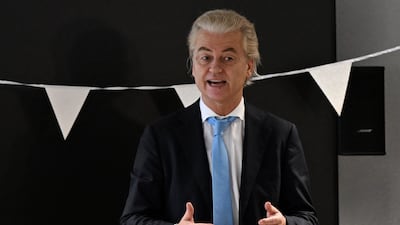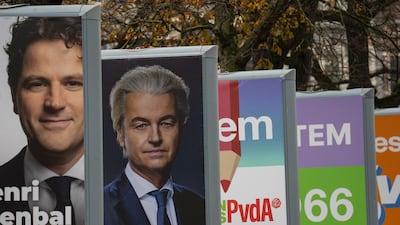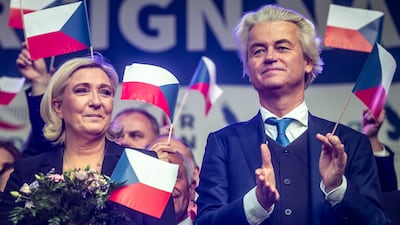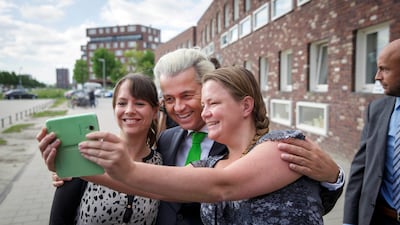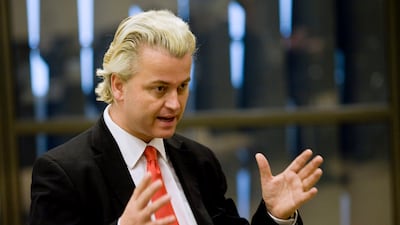Veteran right-winger Geert Wilders recorded a shock Dutch election triumph, which could give his anti-EU, anti-migrant agenda a decisive influence over the next government.
Mr Wilders, 60, wants to form a government after campaigning to halt asylum claims, stop the "Islamisation" of the Netherlands and send no more weapons to Ukraine.
"The Netherlands will be returned to the Dutch, the asylum tsunami and migration will be curbed," Mr Wilders – often compared to Donald Trump for both his hairstyle and uncompromising views – said in a victory speech.
Results showed his Freedom Party (PVV) becoming the strongest force in the new parliament with about 23.5 per cent of the vote, well ahead of a green-left alliance and the ruling centre-right liberals.
As Mr Wilders seeks governing partners, horse-trading to form a coalition could yet water down some of his policies, install a more acceptable figure as prime minister – or exclude him from power altogether.
"The key feature of the Dutch political system is that decisions aren’t made in elections, they are made in the coalition formation," University of Leiden assistant professor Simon Otjes told The National.
Dutch election - in pictures
Islam and migration
Mr Wilders, who was once banned from entering the UK because of his record of incitement, has made his reputation as an anti-Islam agitator and wrote in a foreword to his election programme that "the Netherlands is not an Islamic country".
Habib El Kaddouri, the head of a group representing Dutch Moroccans, spoke of "enormous distress and fear" that Mr Wilders would "portray us as second-class citizens".
Although Mr Wilders's manifesto calls for "no Qurans or mosques" and a ban on Islamic headscarves in parliament, he has said he is willing to put his more extreme demands "in the fridge" to work with other parties. Pundits even joked he had softened into "Geert Milders".
His focus instead has been on migration more broadly. His party wants a total freeze on asylum, people from Syria to be sent home and migrants to be "pushed back" at Dutch borders.
Parties on the centre-right also campaigned on migration after a dispute over the issue brought down departing Prime Minister Mark Rutte's four-party coalition in July.
Mr Rutte's liberals, now led by Dilan Yesilgoz-Zegerius, had a loose governing agreement with the Freedom Party between 2010 and 2012 before it was torpedoed by Mr Wilders. Ms Yesilgoz-Zegerius, a refugee who also campaigned on a hardline migration stance, had hoped to become the first female Dutch Prime Minister but finished third.
Mr Wilders said in his victory speech the PVV "can no longer be ignored".
"Now the campaign is over and the voters have spoken, now we will have to look for agreements with each other," he said.
Potential moderate kingmaker Pieter Omtzigt came out against co-operation with Mr Wilders during the campaign, saying his anti-Islam views violate core Dutch principles.
Frans Timmermans, the leader of the green-left alliance that came second in the election, said his bloc would "never form a coalition with parties that pretend that asylum seekers are the source of all misery".
Geert Wilders through the years - in pictures
EU stage
Mr Wilders's party wants a "binding referendum on Nexit", a Dutch withdrawal from the European Union, like Brexit.
That is unlikely to find favour with potential partners such as the centre-right liberals, whose manifesto lauds the EU as a "means to promote Dutch interests in an unsafe world".
Still, a seat for a Wilders-shaped government at the EU table could shake up the bloc's power balance and give a powerful ally to populists such as Hungary's Viktor Orban.
Although the PVV condemns Russia's invasion, it does not support sending arms such as F-16 fighter jets to Ukraine, saying they are needed for Dutch defences instead. It also describes itself as a staunch friend of Israel, potentially throwing the EU's careful line on the Israel-Gaza war into doubt.
French far-right leader Marine Le Pen was among the gleeful nationalists who celebrated the Dutch result, which she attributed to "people who refuse to see the national torch extinguished".
Climate change
The Freedom Party plays down climate change, saying the Netherlands as a small country cannot save the planet and green legislation should go "straight through the shredder".
Its manifesto calls for "no wind turbines, no solar parks" and for coal and gas-fired power plants to remain open.
A pro-nuclear power stance could be a point of agreement with centre-right parties who campaigned to include it in the Dutch energy mix.
Friends of the Earth Netherlands said a Wilders government would mean "four years of climate change denial, exclusion and a breakdown of the rule of law".
The coalition talks mean a new government will almost certainly not be in place during the Cop28 climate talks beginning in Dubai next week.
It is not uncommon for messy election results in Europe to put a second or third-strongest party in power. Spain's Prime Minister Pedro Sanchez stitched together enough support for a third term despite losing to the centre-right in a recent vote.
The moderate Ulf Kristersson took power in Sweden last year despite polling behind the hard-right Swedish Democrats, who were given policy concessions. Italian Prime Minister Giorgia Meloni formed a government after topping the poll with her Brothers of Italy party, which has roots in neo-fascism, although she has generally adopted a more moderate tone in office.
